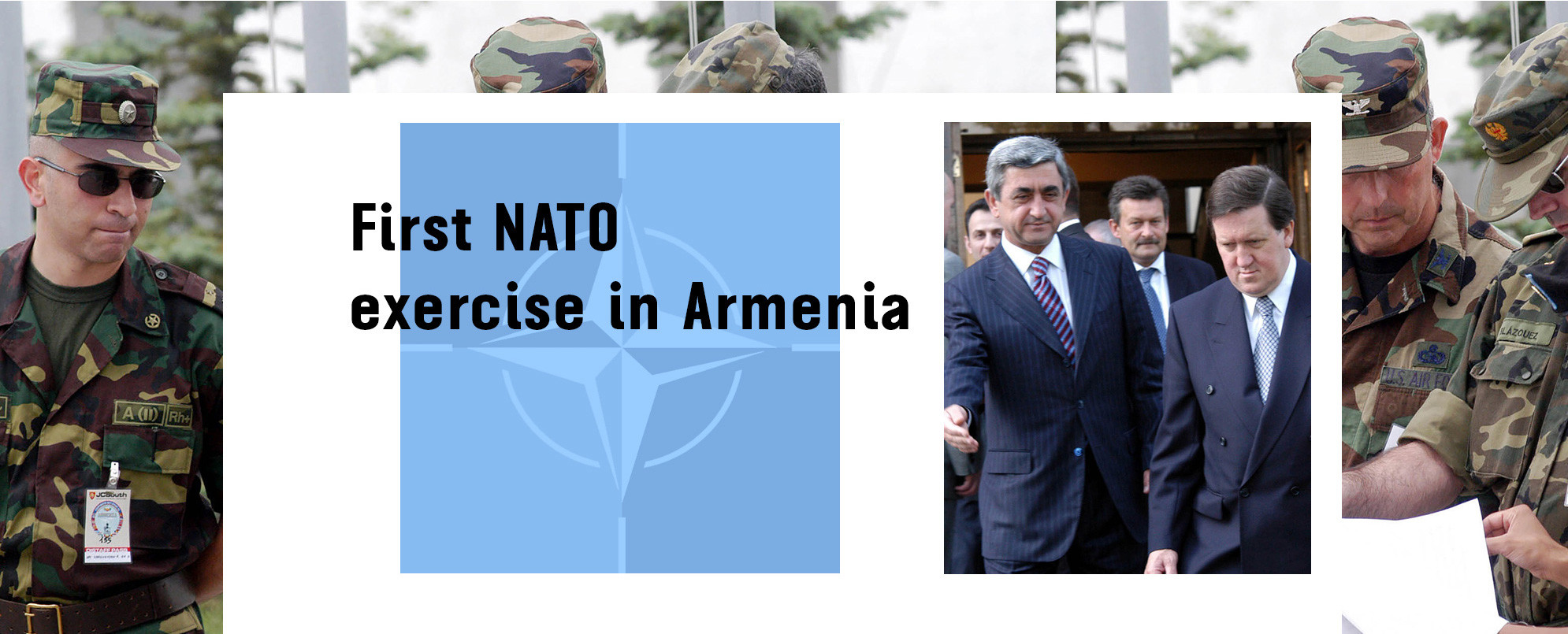
In February 2002 the head of the Armenian Defense Ministry’s department of international military cooperation, Major-General Mikael Melkonian was the one to inform about the conduction of the Cooperative Best Effort exercise in Armenia in the summer of 2003 within the framework of NATO’s Partnership for Peace program.
Prior to that, only joint Armenian-Russian maneuvers had been held in the territory of Armenia, so Melkonian’s words became, if not a sensation, then the “hot” news.

The aim of the Cooperative Best Effort exercise was to improve and exchange light infantry skills exercising in variety of peace support settings and fostering mutual understanding between NATO and partner nations.
Initial planning conference for Cooperative Best Effort 2003 was held in Yerevan on November 12, 2002 with the participation of 65 senior officers from 17 NATO member and partner states.

Mikael Melkonian announced that Russia would take part in the exercises, stressing that Russia’s decision is conditioned by the fact that the exercise would be held in Armenia. General reminded that Russia did not take part in the Cooperative Best Effort 2002 exercise held in Georgia in 2002.
Russia’s factor
The Minister of Defense of Armenia Serzh Sarkissian announced about the intention to invite Russia for the first time in October 2002. He had said in the interview to Russian Nezavisimaya Gazeta that “Russia should not worry” about the holding of joint training in Armenia within the framework of NATO Partnership for peace program.

“The Russian military can directly take part in the exercise. In any case, we shall certainly send such an invitation to the Russian military leadership,” Serzh Sarkissian was saying.
Turkey’s factor
Back in July 2002 Serzh Sarkissian was saying that “there will be nothing terrible if the Turkish military take part in the exercise.”
A few months later, the Armenian defense minister urged not to dramatize the situation in connection with the possible participation of the Turkish military in the Cooperative Best Effort.

Commenting on the statements that the Armenian and Turkish soldiers cannot be allies “by definition”, Serzh Sarkissian said:
“Let us imagine that, God forbid, a militarized terrorist group, which would threaten both Armenia and Turkey, appears in the region. What shall we do in this case? Personally I will cooperate with Turkey with pleasure.”

At the end of 2002, Armenian President Robert Kocharyan also commented on the matter. He noted that “emotionally, I am not thrilled” about the possibility of the Turkish contingent’s participation in the exercises in the territory of Armenia.
“However, as president I realize that competently built relations with NATO are more important for the country,” Robert Kocharyan noted. Answering the questions of the readers of Golos Armenii newspaper, he said that “NATO is the most powerful military-political organization in the world, in fact, the core of the European security system” and “cooperation with NATO undoubtedly has a positive impact on our security level”.
Robertson’s visit
A month before the launch of the exercise, NATO Secretary General George Robertson had visited Armenia. Speaking at a joint briefing with Robert Kocharyan, he said that “Noticeable progress has been marked in Armenia-NATO relations over the last two years.”

“Countries of the South Caucasus are on the front line against new threats of the 21st century,” NATO Secretary General said, noting that holding of Cooperative Best Effort-2003 exercise in Armenia would be useful both for Armenia itself and for the whole region.
At the same time, George Robertson said that “NATO has very good relations with Russia.”

“NATO and Russia have been rivals over many years. However, the situation has radically changed today and we together stand against a common enemy,” the head of the North Atlantic Alliance was saying.
Jone’s interview
On the day of the launch of the exercises in Yerevan, the exclusive interview of General James L. Jones, NATO Supreme Allied Commander Europe, to Mediamax was published.
“We hope that hosting Cooperative Best Effort-2003 exercise will contribute to building a stronger relationship between NATO and Armenia,” the U.S. General said.

“Hosting PfP exercises is a very valuable means to significantly improve interoperability with NATO and Partners. It also creates better opportunities to get involved in the exercise planning process,” James L. Jones noted.

He welcomed “Russia’s decision to take part in this exercise.” “After the establishment of the NATO-Russia Council in 2002, substantial progress has been made in moving towards practical cooperation. Participation in PfP exercises fully reflects this new spirit of cooperation,” NATO Supreme Allied Commander Europe said.
The start
On June 16, 2003, the official opening ceremony of the Cooperative Best Effort 2003 exercise was held in the territory of Vazgen Sargsyan Military Institute with the participation of about 400 militaries from 19 countries.

Speaking at the opening, Serzh Sarkissian said that cooperation with NATO was one of the components of provision of Armenia’s security and that cooperation within PfP becomes more urgent in the face of new threats.

Representative of the NATO Joint Command South, Major-General Raphael Barbudo stated that the key goal of Cooperative Best Effort 2003 was to improve interoperability between NATO members and partner countries. He also welcomed the participation of the Russian military, noting that it indicates that “our relations with Russia are improving.”
Ara Tadevosyan
Photos of Photolur are used in this chapter.



